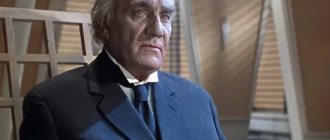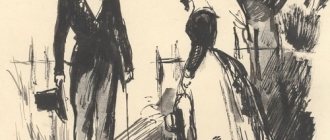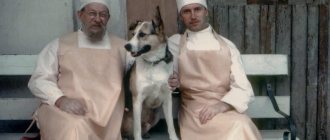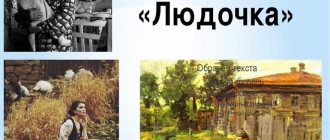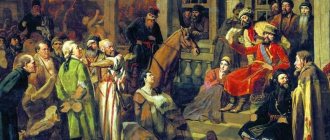Chapter 1
Foma Pukhov was not distinguished by anything but sensitivity - after the death of his wife, he cut his own sausages on her coffin, being hungry. After the funeral, the hero went to bed, but there was a knock on the door with an “unquestioning hand.” The office watchman who came to him handed him a permit obliging Foma to come to work on clearing snow drifts from the railway tracks. This section of the railway led to the front; Red Army trains constantly walked along it. Necessary means necessary. It was not customary to object in those years.
As part of a team of workers, Pukhov goes on this business trip. On one section of the route, where there is especially a lot of snow, the snowplow gets stuck and begins to slip. The driver, who was thrown out of the train by the sudden stop, was injured, and his assistant was killed. The Cossack cavalry detachment was trying to recapture the snowplow for its own purposes, but retreated under the pressure of the Red Army soldiers who arrived in time on an armored train.
The snowplow is rescued from snow captivity by a pusher, and soon it continues on its way.
Pukhov clears the way from snow drifts
Together with other workers who service a snowplow being transported on two steam locomotives, the main character begins to clear the way from snow drifts so that Red Army armored trains and trains can pass. The front is located 60 versts from this place. The snowplow suddenly brakes on one snow block. The workers fall, breaking their heads. The driver's assistant is killed. A mounted detachment of Cossacks surrounds the workers, ordering them to deliver the snowplow and locomotives to the station occupied by the whites. A red armored train arriving at the scene shoots the Cossacks stuck in the snow and frees their comrades.
Chapter 2
The presentation of the second chapter of the summary of Platonov’s “The Hidden Man” begins at the Liski station, where the arrivals were allowed to rest for three days. Pukhov exchanged shag for himself, examined the hanging posters, brought newspapers from propaganda centers, but still he was bored. At one of the barracks I came across an advertisement that invited all those with “skillful proletarian hands” to go to debugging and restoring railway tracks, workshops, communication centers and other institutions needed by young Russia in the Caucasus and Kuban.
Pukhov’s wife died, nothing else kept him in one place, so he tore off a piece of paper and brought it to his friend Zvorychny with an offer to go to the Black Sea. But he had no desire to respond - his wife and son were waiting for him at home.
And a week later, Pukhov and five mechanics went south. In Novorossiysk, the hero was sent to a boat whose engine had broken down in order to repair it. Pukhov suffered for a long time, but he got over it and launched the cunning mechanism. And then he transferred to the ship “Shanya”. The steamer was carrying a Red Army landing party, which was supposed to hit the rear of Wrangel's army. A “real Bolshevik war” is expected, and no one is going to feel sorry for themselves by sitting in safety.
A storm began when "Shanya" approached the Kerch Strait. The reconnaissance vessel following was battered by bad weather - and the people from it had to be taken onto the ship. Fairly overloaded and under the close attention of enemy patrol cruisers, “Shanya” is forced to return back to Novorossiysk.
Main characters
The work is dedicated to the events taking place in Russia after the October Revolution. The author describes the surrounding reality from the perspective of a common person. The main characters of the story are:
- Foma Pukhov is a widower, a worker, searching for the meaning of life and his place during the Civil War.
- Zvorychny is an assistant mechanic on a locomotive, a friend of Foma. He refuses to go to Novorossiysk. Leaving work at the depot, he goes to serve in a special forces detachment.
- Sharikov is a former sailor, a production foreman, and a friend of Pukhov.
- The head of the race is a man waiting to die. He was sentenced to death twice. He was under investigation for the restoration of the bridge near Tsaritsyn, which could not withstand the weight of the military train and sagged. He was shot by the Cossacks.
The main character is a rather contradictory person. The narrative is based on an analysis of his actions and thoughts. At first glance, he may seem rude, cynical, insensitive and lacking in sensitivity. However, Thomas experiences what is happening without showing off his feelings. He is not homebound because he only feels good in the car. Pukhov grieved for his dead wife, but did not tell anyone about it.
He is saddened by the changes that have transformed friends and acquaintances, embraced by new ideas and slogans. Sometimes it seems to him that modern life is too cruel and unfair. Thomas believes that every person should live as his heart tells him, and not according to anyone else's instructions. People like Pukhov are inconvenient for the Soviet government because they are unpredictable and cannot be influenced.
It is no coincidence that the author gives the character a telling name - Thomas. He, like a biblical character, must let the events take place through himself in order to believe in their reality. Until this happens, Pukhov considers himself a lost and lost person.
The title of the work is also connected with the personality of the main character. To characterize it, the author chooses the epithet “secret”, which means:
- secretive;
- hidden from prying eyes;
- secret;
- cordial;
- soulful.
Thomas lives by his own rules, which differ from those accepted by society. He calls himself a “natural fool,” identifying his personality with a fairy-tale character who can cope with any difficulties.
Chapter 3
In Novorossiysk, Pukhov spent about four months as a senior mechanic at the coastal base of the local shipping company. All this time, the hero was busy writing reports about steamship breakdowns and the impossibility of repairing them in real conditions.
Feeling homesick, the hero decided to return. From Tikhoretskaya station he gets to Baku. There he met his acquaintance, the sailor Sharikov, who was tasked with putting the shipping company in order in the Caspian Sea. Let us note in the summary of Platonov’s “The Hidden Man” that Pukhov lived in Baku for seven days - he did not like the city and was tired of it. Sharikov gave him a business trip to the city of Tsaritsyn - to attract workers to Baku and search for new orders.
Life in Novorossiysk
Here comes the news that the Red troops have taken Simferopol. Pukhov spends four months in the city as a senior fitter at a base belonging to the Azov-Black Sea Shipping Company. He is bored from lack of work: few ships arrive, and the main character is mainly engaged in writing reports on mechanical breakdowns. He often walks around the area, enjoying nature. The main character, remembering his deceased wife, is sad, burying his face in the ground, warmed by his breath. Pukhov, Platonov’s “secret man,” wets it with reluctant, rare drops of tears. The summary of the story allows only a passing mention of his state of mind.
Chapter 4
People on the train in which the hero was traveling rush to their native villages and bring flour and cereals exchanged for food from all over the world. These are the women Pukhov saw returning from Turkish Antalya, and the cripple from Argentina.
The train travels, stopping for a long time at stations. Having reached Tsaritsyn, Pukhov found the plant and showed the mandate to some employee. After reading, he glued the paper to the fence. Pukhov again went to the station and boarded a night train going in an unknown direction.
Chapter 7
One day, at dawn, Pukhov woke up from gun salvoes and the rattle of machine guns. I went to see what was happening: there was a Red armored train standing on the tracks, pounding fire towards the bridge. A white train stood five miles away from him and responded in kind.
Pukhov was given a rifle and a grenade. The workers lay down in a ravine, firing back from the White Guards advancing on the city. At the other end of the city, the red units were barely holding back the cavalry of General Lyuboslavsky.
The hero suggested sending the loaded platforms along the rails onto the white armored car. The path goes on a slope, and the platforms, if they are accelerated, will inevitably crash the enemy’s car.
However, this enterprise fails; the platforms are broken without hitting the White Guards' armored train. The workers who ran after were killed by machine gun fire.
Only in the evening the Red Army, having gathered its strength, was able to defeat the white armored train. And in the morning, thanks to the captured trophy, they repulsed the enemy cavalry.
Novorossiysk
What adventures of Thomas has Platonov prepared for A.P.? “The Hidden Man” (a summary is in the article) continues with the trip of Pukhov and his five comrades to Novorossiysk. Three Red ships are heading to Crimea. Our hero sails on the ship "Shanya" and works there as an engine tuner. At night there is a storm, due to which the ships are far from each other. The raging elements do not allow mooring to the Crimean coast, so the ship returns to the city. Here the hero finds a job for 4 months, but often yearns and sheds stingy manly tears for his wife.
Chapter 8
A lot of housing in the city was burned and damaged, but most people survived. Zvorychny and other workers turned their backs on Pukhov, blaming him for the failed attempt to break up the White Guard train and the deaths of the workers. But the hero did not consider himself wrong.
The meeting of the party cell, having examined his case, decided that Pukhov was not an enemy, but simply a strange man. He was required to take political literacy courses and was released.
Work in the workshop burdened Pukhov with its dull monotony. Restless, with restless thoughts in his head, he sends a letter to Sharikov in Baku and a month later receives a reply letter from him inviting him to come to work at an oil mine.
In Pokharinsk, Pukhov is easily dismissed: he doesn’t seem to be a pest, but some kind of dubious person, like the wind blowing in the opposite direction from the sail of the revolution.
Let’s move on to the final chapter of Platonov’s “The Hidden Man” in a summary that is given here.
Homecoming
Pukhov makes the difficult decision to leave his job and leave Novorossiysk. He plans to get home on foot along the coast of the Caspian Sea and the Volga. In Baku, he unexpectedly meets Sharikov, who is appointed senior officer for the restoration of the Caspian Shipping Company. The former sailor instructs Foma to gather qualified workers in Tsaritsino, the shortage of which was acutely felt in the Caspian Sea.
Arriving in his hometown, Foma settled with Zvorychny, who helped him get a job in the workshops as a hydraulic press mechanic . A week later, Pukhov moves into his apartment. He often visits a friend, with whom he often reminisces about the Black Sea over tea.
The whites are attacking the city. Under heavy fire from an armored train, the working self-defense detachment is forced to retreat. Foma proposes to destroy the armored train by lowering platforms loaded with sand from the slope. Pukhov's plan fails, since the platforms that slid down did not cause any harm to the armored train. The workers' offensive is defeated. By morning, two Red armored trains arrived and helped defend the city.
The cell conducted a long investigation to find out whether Thomas was a traitor. They decided that he was just a stupid guy who proposed a ridiculous idea. Working in the workshop makes Foma despondent and melancholy. He decides to write a letter to Sharikov. A month later, a response came from Baku. A friend suggested that he work as a machinist in the oil fields. Foma agrees. Now he monitors the operation of the engine pumping oil from the well to the storage facility.
Time has passed. Life gradually got better. Foma is happy with everything. His only regret is that he has aged a little. Before going to the fishery, he visits Sharikov, to whom his brother recently returned from captivity. Unexpectedly, Foma felt light and warmth in his soul, which slowly turned into strength and confidence . It was nature that passed into him and filled him with courage.
Chapter 9
Pukhov arrived successfully - he managed to get onto a platform with an empty tank, heading just to Baku.
On the spot, looking at Sharikov, he watches how the former craftsman grows into an organizer, no longer living by his own mind, trained in various courses.
The undemanding hero was not given an apartment - he slept in a barn on a box, not far from a running engine that pumped oil from a well.
They tried to marry him and place him in the family, but Pukhov refused, answering that he was “a person of the lighter type.”
Time passed. The work wasn't stressful. The food was hearty. The hero gradually calmed down. Sharikov invited him to join the party, but even here Pukhov refused, saying that he was not fit to join the party, because he was a fool by nature.
One morning he walked to the tower from Sharikov, with whom he was spending the night, and something began to become clearer in the hero’s soul, “overgrown with life”:
Unexpected sympathy for people working alone against the substance of the whole world became clear in Pukhov’s soul, overgrown with life. Revolution is just the best fate for people; you can’t think of anything better.
And there is no longer any room for alarming duality in Pukhov’s soul.
- Good morning! - he said to the driver who met him in the barn.
This concludes the summary of the chapters of Platonov’s story “The Hidden Man.” This work is interesting and ambiguous. And of course, only after reading the story in its entirety will you be able to better understand its essence.
Below we will give a short analysis of Platonov’s “The Hidden Man”.
Summary of “The Hidden Man”
«Foma Pukhov
not gifted with sensitivity: he cut boiled sausage on his wife’s coffin, hungry due to the absence of the mistress.” After burying his wife, having worn himself out, Pukhov goes to bed. Someone knocks loudly on his door. The watchman from the office of the head of the distance brings a permit to work on clearing snow from the railway tracks. At the station, Pukhov signs the order - in those years, try not to sign! - and together with a team of workers servicing a snowplow pulled by two steam locomotives, he sets off to clear the path for Red Army trains and armored trains from snow drifts. The front is sixty miles away. On one of the snow heaps, the snowplow suddenly brakes, the workers fall, breaking their heads, and the driver's assistant falls to his death. A mounted Cossack detachment surrounds the workers, ordering them to deliver locomotives and snow removal to the station occupied by whites. A red armored train arrives and frees the workers and shoots the Cossacks stuck in the snow.
At Liski station, workers rest for three days. On the wall of the barracks, Pukhov reads an advertisement for the recruitment of mechanics to the technical units of the Southern Front. He invites his friend Zvorychny to go south, otherwise “there is nothing to do at the snow removal - spring is already blowing in full force! The revolution will pass, and there will be nothing left for us!” Zvorychny does not agree, regretting leaving his wife and son.
A week later, Pukhov and five other mechanics go to Novorossiysk. The Reds are equipping a landing party of five hundred people on three ships to the Crimea, to Wrangel’s rear. Pukhov sails on the steamship "Shanya", servicing the steam engine. On a pitch-black night, the landing force passes the Kerch Strait, but due to a storm the ships lose each other. The raging elements do not allow the troops to land on the Crimean coast. The paratroopers are forced to return to Novorossiysk.
News arrives of the capture of Simferopol by the Red troops. Pukhov spends four months in Novorossiysk, working as a senior fitter at the coastal base of the Azov-Black Sea Shipping Company. He is bored from lack of work: there are few steamships, and Pukhov is busy writing reports on the malfunction of their mechanisms. He often walks around the city, admiring nature, finding everything appropriate and living to the point. Remembering his deceased wife, Pukhov feels his difference from nature and grieves, burying his face in the earth heated by his breath, wetting it with rare, reluctant drops of tears.
He leaves Novorossiysk, but goes not to home, but towards Baku, intending to reach his homeland along the shore of the Caspian Sea and along the Volga. In Baku, Pukhov meets with the sailor Sharikov, who is establishing the Caspian Shipping Company. Sharikov gives Pukhov a business trip to Tsaritsyn to attract qualified proletariat to Baku. In Tsaritsyn, Pukhov shows Sharikov’s mandate to some mechanic whom he meets at the factory office. He reads the mandate, smears it with his tongue and sticks it on the fence. Pukhov looks at the piece of paper and puts it on the head of the nail so that the wind does not tear it off. He goes to the station, gets on the train and asks people where he is going. “Do we know where? - the meek voice of an invisible man says doubtfully. “He’s coming, and we’re with him.”
Pukhov returns to his city, settles with Zvorychny, the secretary of the workshop cell, and begins working as a mechanic on a hydraulic press. A week later, he goes to live in his apartment, which he calls the “right-of-way”: he’s bored there. Pukhov goes to visit Zvorychny and tells him something about the Black Sea - so as not to drink tea for nothing. Returning home, Pukhov remembers that the home is called a hearth: “Hearth, damn it: no women, no fire!”
The whites are approaching the city. The workers, gathered in groups, defend themselves. A white armored train shells the city with hurricane fire. Pukhov suggests collecting several platforms with sand and launching them down the slope towards the armored train. But the platforms shatter into pieces without causing any harm to the armored train. The workers who rushed to attack fall under machine-gun fire. In the morning, two red armored trains come to the aid of the workers - the city is saved.
The cell figures out whether Pukhov is a traitor, who came up with a stupid idea with platforms, and decides that he is just a stupid guy. Work in the workshop burdens Pukhov - not with heaviness, but with despondency. He remembers Sharikov and writes him a letter. A month later, he receives Sharikov’s response with an invitation to work in the oil fields. Pukhov travels to Baku, where he works as a driver on an engine pumping oil from a well to an oil storage facility. Time passes, Pukhov feels better, and he regrets only one thing: that he has aged a little, and there is nothing unexpected in his soul that was there before.
One day he goes from Baku to fish. He spent the night with Sharikov, to whom his brother returned from captivity. Unexpected sympathy for people working alone against the substance of the whole world becomes clear in Pukhov's soul, overgrown with life. He walks with pleasure, feeling the kinship of all bodies to his body, the luxury of life and the fury of bold nature, incredible in silence and in action. Gradually he realizes the most important and painful thing: desperate nature has passed into people and into the courage of the revolution. The spiritual foreign land leaves Pukhov in the place where he stands, and he recognizes the warmth of his homeland, as if he had returned to his mother from an unnecessary wife. Light and warmth intensified over the world and gradually turned into human strength. "Good morning!" - he says to the driver he meets. He indifferently testifies: “Completely revolutionary.”
